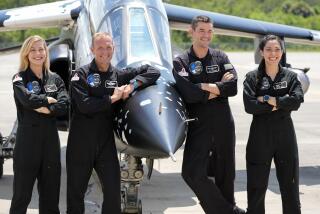‘Everything Is Go’ for Launch of Shuttle
- Share via
KENNEDY SPACE CENTER, Fla. — The much-delayed launch of the Hubble Space Telescope was back on track Monday, and officials expected the space shuttle Discovery to blast off at around 5:31 a.m. PDT today.
“The astronomers are starting to tingle again,” Lennard A. Fisk, chief scientist for the National Aeronautics and Space Administration, said Monday.
The most recent delay began on April 10, just four minutes before the shuttle was scheduled to blast off, when a hydraulic system that powers most of Discovery’s mechanical parts failed. The unit was replaced, and on Monday Al Sofge, the test director at the sprawling spaceport here, was able to declare confidently: “Everything is go.”
Even the weather appeared to be cooperating, although thundershowers were expected to lash much of the central Florida coast Monday evening.
“We are expecting fairly clear skies (by launch time),” said Air Force weather officer Tom Strange. He said the launch was “80% go” with only a 20% chance that showers would force a delay.
Less than one full day after the launch, Discovery is to deploy the space telescope, which Fisk has described as the most sophisticated satellite ever launched into orbit.
It is also the most expensive. The telescope itself cost more than $1.5 billion, and ground support facilities have pushed the total cost to around $2.1 billion. That is about 20 times the cost of the largest ground-based telescope ever built, but since the space telescope will be above the Earth’s atmosphere it is expected to produce images that will be 10 times sharper than the best photographs from ground-based telescopes.
Astronomers hope to see their first images seven days after the shuttle releases the telescope 380 miles above the Earth, although the first images are not expected to be of the highest quality because the telescope will be at the beginning of a seven-month calibration.
But even if the first photos are a little fuzzy, astronomers around the world will be waiting anxiously to see “first light” from an instrument that is expected to dominate the world of astronomy for at least the next decade.
Discovery, with an all-veteran crew, is commanded by Air Force Col. Loren J. Shriver, 45. The pilot is Marine Col. Charles F. Bolden, 43, and the mission specialists are Bruce McCandless, 52, Kathryn D. Sullivan, 38, and astronomer Steven A. Hawley, 38, who will use the shuttle’s robot arm to lift the telescope out of the shuttle’s cargo bay and gently set it free.
The flight is scheduled to end Sunday with a landing at Edwards Air Force Base in Southern California.
More to Read
Sign up for Essential California
The most important California stories and recommendations in your inbox every morning.
You may occasionally receive promotional content from the Los Angeles Times.













